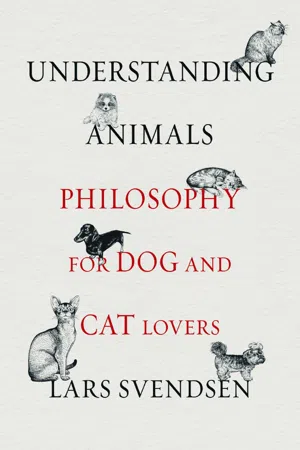
- English
- ePUB (mobile friendly)
- Available on iOS & Android
About this book
How do animals perceive the world? What does it really feel like to be a cat or a dog? In Understanding Animals, Lars Svendsen investigates how humans can attempt to understand the lives of other animals. The book delves into animal communication, intelligence, self-awareness, loneliness, and grief, but most fundamentally how humans and animals can cohabit and build a form of friendship. Svendsen provides examples from many different animal species—from chimpanzees to octopus—but his main focus is on cats and dogs: the animals that many of us are closest to in our daily lives. Drawing upon both philosophical analysis and the latest scientific discoveries, Svendsen argues that the knowledge we glean from our relationships with our pets is as valid and insightful as any scientific study of human-animal relations. With this entertaining and thought-provoking book, animal lovers and pet owners will gain a deeper understanding of what it is like to be an animal—and in turn, a human.
Frequently asked questions
- Essential is ideal for learners and professionals who enjoy exploring a wide range of subjects. Access the Essential Library with 800,000+ trusted titles and best-sellers across business, personal growth, and the humanities. Includes unlimited reading time and Standard Read Aloud voice.
- Complete: Perfect for advanced learners and researchers needing full, unrestricted access. Unlock 1.4M+ books across hundreds of subjects, including academic and specialized titles. The Complete Plan also includes advanced features like Premium Read Aloud and Research Assistant.
Please note we cannot support devices running on iOS 13 and Android 7 or earlier. Learn more about using the app.
Information
Table of contents
- Front Cover
- Half Title
- Title Page
- Copyright
- Contents
- Introduction
- ONE Wittgenstein’s Lion and Kafka’s Ape
- TWO Language
- THREE Seeing Animal Consciousness
- FOUR A Human Form
- FIVE Mind-reading
- SIX Intelligence
- SEVEN For Now We See through a Mirror, Darkly
- EIGHT Time
- NINE Can Animals Be Understood?
- TEN Surroundings
- ELEVEN To Be an Animal
- TWELVE The Dog
- THIRTEEN The Cat
- FOURTEEN The Octopus
- FIFTEEN Loneliness and Grief
- SIXTEEN Do Animals Have Morals?
- SEVENTEEN Humans and Other Animals
- EIGHTEEN Friendship
- REFERENCES
- BIBLIOGRAPHY
- ACKNOWLEDGEMENTS